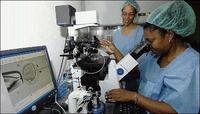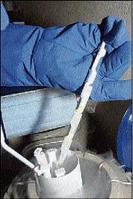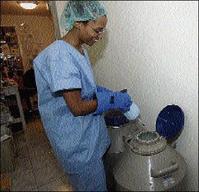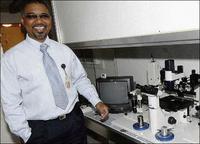Avia Collinder, Outlook Writer

Technicians in the University Fertility Unit prepare specimens.
Married to a 'musical judge' for the last 20 years, and father of three children, Dr Vernon DaCosta has had the pleasure of spreading his own version of familial bliss to childless couples and those who wish to restrict the size of their families, through his work at the University of the West Indies' (UWI) Fertility Management Unit.
A consultant in the fertility unit for the last 19 years, he was in 2,000 recognised for his years of "outstanding and dedicated service" to the University Hospital of the West Indies.
The fertility unit, which he embraces as the main forum for his work, is currently involved in delivering new services, which are themselves award-winning in terms of the relief with which they provide their users.
Dr DaCosta reminds Outlook, "Before 2,000, assisted reproductive technology was not available here."
He was a part of the team, including Prof Joseph Fredericks and others - who have been delivering the pioneering service and conducting related research.
Vernon DaCosta is also the consultant responsible for no-scalpel (no-cutting) vasectomy at the fertility unit, a programme that has great potential, as it is an economical method of contraception and provides men with an opportunity to actively participate in the family-planning process.
Minimally invasive surgery

University Hospital Fertility Clinic offers infertile couples the hope of having children.
The fertility unit, additionally, offers minimally invasive surgery (laparoscopic and hysteroscopic surgery, which are both camera- assisted procedures in the womb area) and the new technique of no-scalpel vasectomy.
This kind of vasectomy requires the use of no-cutting instruments. Instead a sharp, pointed forcep is used to create an opening in the skin, through which the doctor locates the vas deferens and removes a section to stop the emission of seminal fluid. Because no cut has been made, there is also no need for sutures or stitches, and recovery time is much quicker.
At the fertility unit, the medical doctor has been responsible for several new operational protocols, or ways of conducting treatment, including the intrauterine (in uterus) insemination programme and the Operative Hysteroscopy Protocol, which is the standard way of conducting the camera-assisted operations in the womb area.
He was also responsible for the development of a standard operation for the treatment of endometriosis (a condition in which the lining of the womb is present in other organs and areas of the body) in the infertile patient.
Vernon DaCosta was born on August 5, 1955, in St Elizabeth, to parents Vernon and Audrey, a trucker and housewife, who sent him to Cornwall College, Montego Bay, to attend high school.
Later - in 1974 - he became a student in the Faculty of Natural Sciences, University of the West Indies, before transferring to the Faculty of Medical Sciences in 1975.
In 1980, he acquired his bachelor's degree in medicine, and in 1991 he gained the Doctor of Medicine in Obstetrics and Gynaecology.
Dr DaCosta's postgraduate work has been extensive, and includes work done during his time as registrar in obstetrics and gynaecology at Mayday University Hospital, London, England, between 1992-1993.
Since 1996, he has been a lecturer in Obstetrics and Gynaecology at the UWI, where he is also a member of the Speciality Board for Obstetrics and Gynaecology, member of the Records Committee and, periodically, acting director of the Fertility Management Unit, when Professor J. Frederick is not available.
Today, Dr DaCosta is responsible for the training of residents (new medical doctors) in minimally invasive surgery (no extensive cutting) , instructing postgraduate doctors and medical students during ward rounds, which are conducted daily.
The consultant also instructs postgraduate doctors and medical students, during antenatal, gynaecological out-patient and family planning clinics. He trains unit registrars to perform state-of-the-art surgical procedures, such as operative laparoscopy and operative hysteroscopy. They are also trained to perform transvaginal oocyte (egg) recovery and embryo transfer.
Dr DaCosta was one of the consultants involved in the establishment of the in vitro fertilisation programme. This programme was developed as a result of the high demand for assisted reproduction by Jamaican couples.
As consultant responsible for the no-scalpel vasectomy programme, Dr DaCosta conducts the actual procedure and instructs postgraduate doctors how to carry out these procedures.
Minimally invasive surgery is beneficial to both the patient and hospital. The patients benefits because they are treated on a day-case basis, and so recovery time is minimal and, consequentially, financial losses are less.
The hospital benefits because there is less utilisation of the resources of the hospital.
The Fertility Management Unit of the UWI is the only such hospital unit in the Caribbean region which offers this service of assisted reproductive technology, along with minimally invasive surgery. The unit is now a big income earner for the institution, as patients do pay.

The work of the unit brings hope.
Dr DaCosta's work over the years has included the presentation of numerous medical papers and the conduct of workshops, including The Junior Fellows of the American College of Obstetricians and Gynaecologists, Symposium on Infertility and Assisted Reproduction held in Kingston where, in 2000, he presented the paper 'Investigation of the Infertile Couple'.
This presentation examined the causes of infertility and discussed the methods of diagnoses of the infertile couple.
Dr DaCosta's research including a pilot study in the efficacy of laparoscopic uterine artery ligation for the treatment of symptomatic uterine leiomyomata.
Uterine leiomyomata is one of the most common gynaecological disorders among Jamaican women, resulting in major gynaecological surgeries, such as myomectomies and hysterectomies.
Successful laparoscopic uterine artery ligation, which is an alternative treatment for uterine leiomyomata, will result in minimal hospital stay, more rapid recovery period and economical for both patient and hospital.
The medical doctor's public service involves providing obstetric and gynaecological consultation for patients attending the Diabetes Association of Jamaica in Kingston.
In reflecting on the evolution of his career, Dr DaCosta admits that he went into private practice for six years, after resigning from his post at Cornwall Regional Hospital over a personality conflict.
Back on track

Dr Vernon DaCosta, lecturer and fertility specialist at the University Hospital of the West Indies. - PHOTOS BY Ian Allen/Staff Photographer
He got back on his current track, he states, after telling himself that he could not allow one man to affect him in this way. He reapplied for further study and was accepted.
After several decades spent investing in his career, the medical doctor is now a member of the Royal College of Obstetricians and Gynaecologists, the American Society of Colposcopy (colposcopy is a test in which the doctor uses an instrument called a colposcope to look at the cervix with magnification for abnormal cells) and Cervical Pathology, the American College of Obstetricians and Gynaecologists and the American Association of Gynaecologic Laparoscopists.
He is also a member of the American Society for Reproductive Medicine.
Married on July 5, 1980, to Carol Andrea DaCosta, nee Gonzalez, the resident magistrate whom he met while she worked as a singer at the Jonkonnu lounge in Kingston, today, he is father of three children - Vernon III, Danielle and Shannon.
All his children, Dr DaCosta boasts, are good singers whose recordings might soon be heard in the public area.
Marriage, he states, was his luckiest move in the life - "the best thing".
"I go home and I am at peace," he says, concluding, "I give all credit for what I have achieved to my wife."

